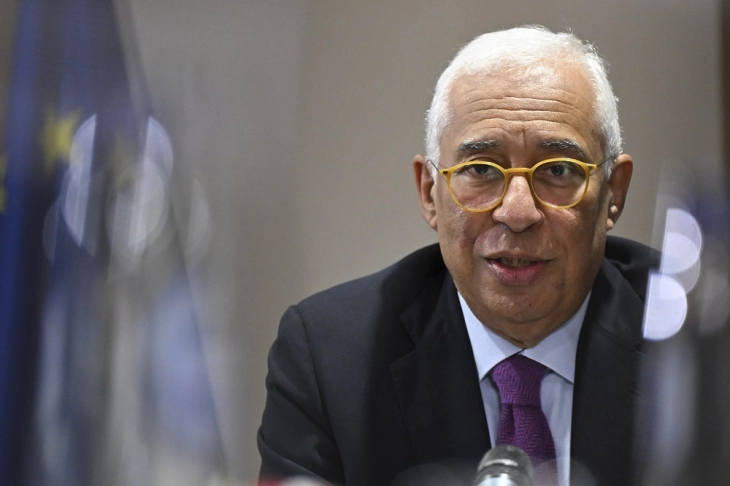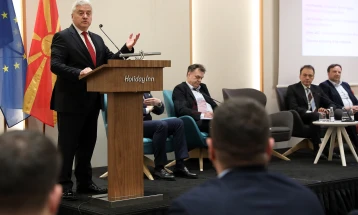Need to work on ensuring North Macedonia meets precondition for formal opening of negotiations, Costa tells MIA
- We need to work on ensuring that North Macedonia respects all the commitments that are a precondition to formally open the negotiations, the President of the European Council, António Costa, said in an interview Monday with a group of journalists from the Western Balkans, including MIA’s Brussels correspondent.

Brussels, 16 December 2024 (MIA) - We need to work on ensuring that North Macedonia respects all the commitments that are a precondition to formally open the negotiations, the President of the European Council, António Costa, said in an interview Monday with a group of journalists from the Western Balkans, including MIA’s Brussels correspondent.
“It's necessary to respect what North Macedonia has already committed to. I think it's very important to achieve this, to strengthen the confidence between North Macedonia and the neighbours, especially with Bulgaria, and we need to work on ensuring that North Macedonia respects all the commitments that are a precondition to formally open the negotiations. I have great respect for the huge effort made by North Macedonia in the past to overcome the obstacles, especially with Greece. It is a partner that even changed its name to overcome this obstacle,” Costa stressed in answer to MIA’s question.

Regarding 2030, as a deadline set by his predecessor, Charles Michel, for a probable new enlargement, Costa stressed he doesn’t believe in “artificial calendars”.
“The most important thing is that all of us understand that we have little time, and that we have this sense of urgency. And each day it's more difficult for the people from the Western Balkans to believe that, in fact, one day we conclude this process,” Costa said.
Costa added that he can’t say if that will happen next year or in four years, but the focus, he said, must be placed on what needs to be done.

“The sooner we manage to conclude the reforms, the sooner we manage to fulfil all the criteria, the sooner we conclude this process and each Western Balkan partners enter in the European Union and the sooner this happens, the sooner we will have a more safe, secure and prosperous Europe,” he added.
According to the President of the European Council, enlargement consists of two dimensions – negotiations between the European Commission and the candidate countries, and the approval by unanimity from all member states, which is why, he said, the summit is an important moment for everybody to speak face to face and try to find a common ground.
“Look, I'm coming also from a country with experience of the accession. And I know that it is not easy every day, there are advancements and then setbacks, problems arise. The most important thing is to keep our common will to conclude this process and to understand that it is a merit-based process, but the sense of urgency implies that all of us work harder and faster to conclude the process,” Costa said.

Asked by MIA’s correspondent about the new momentum that needs to be given at this stage of the negotiation process, which Costa spoke of in his invitation for the upcoming EU summit, Costa said it referred not only to the negotiation process, but also to the implementation of the Growth Plan.
“This is a huge investment. And this is very important because it's not only to build infrastructures, but it's also to support reforms and these reforms are very important for the accession. But they are more important for the prosperity of the different Western Balkans partner. And for this, I think there is very important momentum. And we are now in the new institutional cycle. And this is a very good moment to boost this process and I hope the summit this week could be a very important step to boost this process,” Costa underscored.
In the interview, Costa stressed that the EU is more than a single market or a single currency, assessing it as a “union of values”.

“I think this accession path is also the best way to ensure that everybody implements the necessary reforms to have and to respect our European standards of values, namely on the rule of law,” Costa said.
The President of the EU Council stressed he finds it very important to be in close touch with the Western Balkans citizens because of the need to build a new era of trust between the EU and partners from the region.
“Enlargement is one of the key priorities for my mandate. I have already had the opportunity to meet with all the leaders of the six Western Balkans partners and have conversations with them. We are organising this week this very important summit with all the 27 member states and the 6 Western Balkans candidate partners, because I think it's very important not only to speak about enlargement but also to give the clear idea that this is a real commitment to ensure a gradual enlargement that will provide citizens with the effective results of this process. Of course, the Growth Plan is the great framework and the game changer for our relations in the future, but also concrete results like the accession to the Single European Payment or the roaming or the accession to the Erasmus programme. Those are some concrete results that the citizens could already experience and anticipate in some way for the future,” he said.

Costa stressed the importance of building trust and avoiding misunderstandings, not only with the European Union, but also among the different Western Balkan partners, in order to create conditions to move forward and ensure a common future.
“We need always to remember that we are in the European Union because after the dramatic World War Two, Germany and France decided to close the door for the past and build together a common future. This is a major achievement and this is the spirit of our Union. That's why this enlargement is so important, because the Western Balkans are part of our European family. We share the same history, the same values, and the same culture in our diversity. This is also the most important geopolitical investment we can do for our security and prosperity for the future. I hope during my term it will be possible to give definitive steps to achieve this goal,” Costa said.

Regarding the assessments that the EU needs to implement internal reforms before it is ready to accept new members, Costa said the question of what should be done – enlargement or internal reforms – is a “classical debate” that existed before the Union’s enlargement with ten countries in 2004 as well.
“We made the enlargement in 2004, and we approved the Lisbon Treaty in 2009. Of course, we need to look also for our internal reforms, but we don't need to block what we are doing and what we need to do in the accession process because it takes time,” he underlined.
Costa added that in the first semester of 2025, the European Commission should present proposals about the implementation of both processes.

“I think it's possible to manage these two processes in parallel. It's more difficult because that means more work, but it is not impossible to work on both processes at the same time. But the most important thing is to keep this accession process with the Western Balkans on track and to overcome this lack of confidence among the parties. But it's also necessary, let me stress this, that the Western Balkans partners make an effort to overcome their bilateral problems, to have a good result in this process,” Costa noted.
Asked about proposals to scrap the need for consensus when making decisions during enlargement negotiations in order to avoid potential bilateral vetoes, Costa said good faith and good will are required to overcome problems.
“If everybody is in good faith, if we work well, we don't have vetoes and we don't need to change the rules and we need to respect the rules. And what we need is to deliver results. And for this, we need to work,” Costa said in the interview with Western Balkan media, including MIA.
Sashko Panajotov
Photo: European Council











